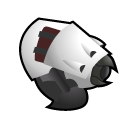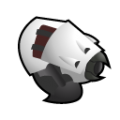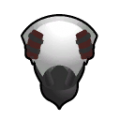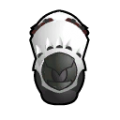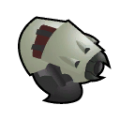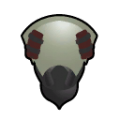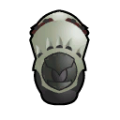Difference between revisions of "Scorcher"
| Line 14: | Line 14: | ||
| min comfortable temperature = -100 | | min comfortable temperature = -100 | ||
| max comfortable temperature = 250 | | max comfortable temperature = 250 | ||
| − | | bandwidth = 1 | + | | bandwidth cost = 1 |
| bodysize = 1 | | bodysize = 1 | ||
| healthscale = 0.7 | | healthscale = 0.7 | ||
Latest revision as of 12:15, 24 November 2024
| This article relates to content added by Biotech (DLC). Please note that it will not be present without the DLC enabled. |
Scorcher
A close-approach war mechanoid that specializes in incendiary attacks. Its flame burst attack has little reach, but once it closes on a group of defenders it can ignite and disrupt them with blasts of searing flame.
Base Stats
- Type
- Mechanoid
- Flammability
- 0%
Mechanoid
- Bandwidth Cost
- 1
Armor
- Armor - Sharp
- 40%
- Armor - Blunt
- 20%
- Armor - Heat
- 200%
Pawn Stats
- Combat Power
- 75
- Move Speed
- 4.5 c/s
- Health Scale
- 70% HP
- Body Size
- 1
- Mass
- 60 kg
- Pack Capacity
- 35 kg
- Carrying Capacity
- 75 kg
- Filth Rate
- 1
- Comfortable Temp Range
- -100 °C – 250 °C (-148 °F – 482 °F)
Melee Combat
- Attack 1
- Front left leg
12 dmg (Blunt)
18 % AP
2 second cooldown - Attack 2
- Front right leg
12 dmg (Blunt)
18 % AP
2 second cooldown - Attack 3
- Head
8.5 dmg (Blunt)
13 % AP
2 second cooldown
0.2 chance factor - Average DPS
- 3.36
Creation
- Required Research
- Standard mechtech
- Gestation Cycles
- 2
- weaponTags
- MechanoidGunMiniFlameblaster
A scorcher is a mechanoid added by the Biotech DLC.
Acquisition[edit]
Scorchers can be gestated by a mechanitor at a large mech gestator once the standard mechtech research project has been completed. Note that this research requires a signal chip to unlock. Each requires ![]() 80 Steel,
80 Steel, ![]() 32 Plasteel,
32 Plasteel, ![]() 3 Components,
3 Components, ![]() 1 Standard subcore and 2 gestation cycles taking 1,800 ticks (30 secs) each to initiate. They take up 1 bandwidth from their linked mechanitor.
1 Standard subcore and 2 gestation cycles taking 1,800 ticks (30 secs) each to initiate. They take up 1 bandwidth from their linked mechanitor.
Dead, friendly scorchers can also be resurrected at the large mech gestator using the "Resurrect medium mechanoid" bill. This requires the corpse of the friendly scorcher, ![]() 50 steel, and 1 gestation cycle taking 1,800 ticks (30 secs) to initiate.
50 steel, and 1 gestation cycle taking 1,800 ticks (30 secs) to initiate.
Summary[edit]
As mechanoids, every scorcher is immune to fire, Flame and Heat damage, and temperature extremes, despite having Comfortable Temperatures defined. They have 100% Toxic Resistance and Toxic Environment Resistance, making them immune to toxic buildup, rot stink and other toxic effects. They do not need to eat, rest, and have no mood. They will be stunned by EMP attacks for a time proportional to the EMP damage inflicted and will "adapt" and rendered immune to further EMP strikes for 2,200 ticks (36.67 secs).
Dead scorchers may be shredded at the machining table or crafting spot for ![]() 15 steel. However, these values are affected by mechanoid shredding efficiency, as well as missing parts on the scorcher.
15 steel. However, these values are affected by mechanoid shredding efficiency, as well as missing parts on the scorcher.
As an enemy[edit]
Scorchers will charge at the player, then try to stay at maximum range. Due to the short-ranged nature of their weapon, this behavior is somewhat counterproductive - see #Combat for more detail.
Mechanoids can raid the player's base through events, and are found in most poison ships, psychic ships, and mech clusters![]() . Scorchers are a fairly low level threat, but can be dangerous with other mechs.
. Scorchers are a fairly low level threat, but can be dangerous with other mechs.
As an ally[edit]
Mechs under player control require power: scorchers use 10% of their power per day while active. If set to dormant self-charging, they instead recharge for 1% power / day, without pollution. They recharge in a large mech recharger (400W), for 50% power/day, creating 5 wastepacks whenever the recharger's waste is filled up.
Combat[edit]
Scorchers are equipped with a mini-flameblaster. With a range of just 4.9 tiles, it is the shortest ranged weapon in the entire game. However, it has the unique property of being able to fire during melee combat. Enemies are able to do so but do not actively take advantage of this fact.
As its name suggests, the mini-flame blaster lights pawns on fire, which will cause them to run around wildly if there is no firefoam or water around. All mechanoids are completely immune to fire.
Analysis[edit]
| This section is a stub. You can help RimWorld Wiki by expanding it. Reason: General viability (is it good/bad?) post-bandwidth change. More specific for when it is good. |
As an enemy[edit]
Enemy scorchers are usually not much of a threat on their own. A scorcher in range of firing is also just a few tiles from melee range, and can be shot down as it tries to approach. But if it gets to shoot, fire is a very dangerous condition. It will send your pawns careening into the attacks of other mechanoids. A firefoam pop pack is useful.
Scorchers may appear in quest buildings such as the ancient complex. In these close-quarters situations, they can pose a significant threat as the small rooms in the building mean they can easily burn all of your raiders as they open a room without visibility, and rooms deep in the complex will heat up quickly to extreme temperatures. Keep your raiders spread out when entering rooms, and extinguish fires quickly after taking out the scorcher. In dire circumstances, forcefully break outside walls with melee attacks to return to a normal outdoor temperature.
As an ally[edit]
Scorchers have a very limited range, so are dedicated to melee combat, or to help other pawns out in melee combat. Scorchers can be very effective in hallways, either in melee or just behind a melee blocker. Fire will cause vulnerable enemies to stop attacking, which allows pawns in the front lines to survive for longer, giving more time to kill in general. Effective against infestations.
Earlier on, scorchers are also decent out in the open - but a few scorchers won't be enough to suppress a large tribal raid.
Scythers are accessible at the same time, have higher melee damage, melee penetration and almost twice the health scaling, but lack crowd-controlling flamethrower. Also, low bandwidth cost means you can have two scorchers for every Scyther.
Health[edit]
Body parts[edit]
| Body Part Name | Health | Quantity | Coverage[1] | Target Chance[2] | Subpart of | Internal | Capacity[3] | Effect if Destroyed/Removed |
|---|---|---|---|---|---|---|---|---|
| Thorax | 28 | 1 | 100% | 4% | N/A[4] | - | Death Will never take permanent injury | |
| Neck | 21 | 1 | 10% | 2% | Thorax | Communication | Death Will never take permanent injury | |
| Head | 21 | 1 | 80% | 2.7% | Neck | - | Death Will never take permanent injury | |
| Artificial Brain | 7 | 1 | 10% | 0.8% | Head | Data Processing | Death Will never take permanent injury | |
| Sight Sensor | 7 | 2 | 20% | 1.6% | Head | Sight | −25% Sight. −100% if both lost. Will never take permanent injury | |
| Hearing Sensor | 7 | 2 | 5% | 0.4% | Head | Hearing | −25% Hearing. −100% if both lost. Will never take permanent injury | |
| Chemical Analyzer | 7 | 1 | 6% | 0.48% | Head | - | Will never take permanent injury | |
| Leg | 21 | 4 | 18% | 9% | Thorax | Moving | −25% Moving. Will never take permanent injury | |
| Foot | 14 | 4 | 50% | 9% | Leg | Moving | −25% Moving. Will never take permanent injury | |
| Reactor | 14 | 1 | 6% | 6% | Thorax | Power Generation | Death Will never take permanent injury | |
| Fluid Reprocessor | 10.5 | 2 | 4% | 4% | Thorax | Fluid Reprocessing | Death if both lost −50% Fluid reprocessing Will never take permanent injury |
- ↑ Coverage determines the chance to hit this body part. It refers to the percentage of the super-part that this part covers, before its own sub-parts claim their own percentage. For example, if the base coverage of the super-part is 100%, and the coverage of the part is 20%, 20% of hits would hit the part, and 80% the super-part. If the part had its own sub-part with 50% coverage, the chances would be 10% sub-part, 10% part, 80% super part.
- ↑ Target Chance is the actual chance for each part to be be selected as the target when each part's coverage has been taken into account(I.E. Neck covers 7.5% of Torso but Head covers 80% of Neck so it actually has only a 1.5% chance to be selected). This is not pure hit chance, as different damage types propagate damage in different ways. See that page for details.
- ↑ Note that capacities can affect other capacities in turn. Only the primary effect is listed. See specific pages for details.
- ↑ This is the part that everything else connects to to be considered 'connected'.
Gallery[edit]
Version history[edit]
- Biotech DLC Release - Added.
- 1.4.3555 - Bandwidth cost reduced from 2 to 1.
